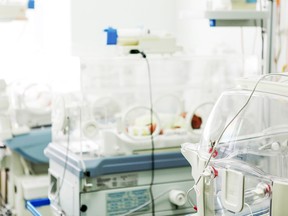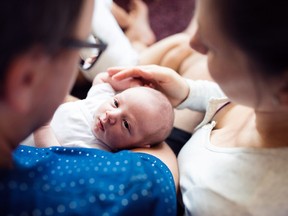Euthanasia for Babies ... Timely or Forbidden?
"[With surgery and life support] we can sometimes keep their body [infants] alive for years. But that child would never be able to process the outside world in a cognizant way.""Some families ask, 'If they're going to die at the end of this anyway, maybe three weeks from now, and we don't believe they're going to have meaningful positive experiences between then and now, why must we all have to go through this period of waiting'?""I reassure them that we are, and will continue to do everything that we can to ensure that their child doesn't suffer now or as things progress.""In many scenarios, what we actually see, even in the first few hours, long before the effects of dehydration or decreased calories become manifest, what we often see is a real calming of symptoms of discomfort.""There is life, there is intrauterine life, and there are memories to be made, and many families that we work with make beautiful and enjoyable memories as a family.""It's not what they wished for, but given the circumstances, they're accepting of that."Dr. David Lysecki, paediatric palliative care specialist, division head, palliative medicine, Department of Pediatrics, McMaster University"We are not at all talking about babies born with a handicap. We are really talking about situations which, at birth, are incompatible with life in the short term -- in a matter of days, weeks or months"Pediatricians there [Netherlands] were faced with very dramatic situations, like it is the case all around the world, where babies would come to the world with life expectancies which were non-existent.""We're talking not even 0.001 percent, we're talking about no chances of surviving.""The doctors would look at these babies and agonize and wait until they would die, and they had parents asking them if it was really necessary to let them agonize of the sort for days or weeks at a time."Dr.Alain Naud, family physician, clinical professor, Laval University
 |
"[In the 15 years since legalization' we've had only two cases so far. So, an enormous drop in numbers [from the previous average of three cases per year].""[In the two cases one a child with progressive deterioration of the brain, the other a severe case of epidermolysis bullosa, [a skin disease.] Your skin doesn't stick to your body. The suffering is clear to everyone who treats the child. In the severest cases these children die after weeks or months of suffering.""You can always induce constant coma to treat suffering. But what is the use of constant coma for a child? For many parents that is not a life worth living."Dr. Eduard Verhagen, Netherlands
Last week a hornet's nest was stirred when a member of Quebec's college of physicians speaking to a joint House of Commons committee studying Canada's MAID (Medical Assistance in Dying) law spoke of including a clause to deliberately and actively end the life of an infant in instances of grave malformation, and where basically life expectancy would be reduced to 'nil'. Babies born missing the upper layers of the brain; having a brain stem to keep their organs operating but no part of the brain to grow outwardly, experience life, have thoughts, express emotions. Higher brain functions entirely absent.
Faced with this kind of unforgiving situation most parents would choose not to pursue aggressive treatments in the prolongation of a child's life. With intervention withheld the child would die agonizingly slowly, taking weeks to do so. Hastening death by deliberate inaction is illegal for children in Canada. Dr. Louis Roy who made that recommendation to the committee on AIDS, on expanding eligibility criteria for MAID, reflected a stance the college took in support of newborn euthanasia in instances where an extremely poor prognosis was made, with "extreme suffering that cannot be relieved".
Dr. Roy's testimony circulated by way of a video clip engendered outrage among advocacy groups over perceived infanticide. "An infant cannot consent to their own death. This isn't MAID, it's murder" accused Krista Carr, executive vice-president of Inclusion Canada. The response to which was that the college was not suggesting killing babies with physical or intellectual disabilities. And nor do bioethicists feel complacent about the recommendation. Dr. Bowman of University of Toronto has his doubts that newborns, even those that are severely ill at birth experience horrendous pain.
"I have never seen that, especially with babies", he averred based on his experience as a clinical ethicist with years of frontline experience working with high-risk pregnancies relating to malformed fetuses and babies born with extreme disability. Serious disorders or deformities which are frequently diagnosed in utero, preceding birth, through routine ultrasounds."Most of the battles are parents who say "We want everything done, we're waiting for a miracle'," when babies are born with a grim prognosis. This, in the face of the baby having experienced four or five massive cerebral bleeds "which, as you can imagine, creates a terrible prognosis".
There are some babies born with rare and major defects of heart, lung, intestines or liver. Some are missing kidneys, or with organs that develop outside the body. Canadian doctors report "conversations are occurring with parents", with specific and explicit requests for MAID, from parents involving very young children. The Netherlands' Groningen Protocol is viewed by the Quebec college of doctors as an 'avenue' for exploration in Canada. The protocol sets out eligibility criteria, guidelines and reporting system for euthanasia of severely ill newborns and infants "for whom there is no hope of improvement", with presumably unbearable suffering.
Concerns in the Netherlands that doctors were performing and not reporting newborn euthanasia led to the existence of the protocol, to prevent "uncontrolled and unjustified euthanasia". And to keep track of who the children were, being euthanized, why it was happening and who was performing the act of euthanasia. Once the protocol was adopted by the Dutch government in 2007 the average of three child euthanasia cases annually dropped to two cases in the 15 years since the protocol became law. "So, an enormous drop in numbers", remarked Dr.Eduard Verhagen, who wrote the protocol.
 |
"I'm not convinced we need this, because it's not the wishes and values of the patient anymore. It's the wishes and values of the parents.""Look, I get it, that's what we do, that's what parents do [make decisions for children]. But it's not as clean a distinction, ethically, as it is when someone says, 'I've been living with this pain for 15 years and I can't do it anymore'. That's very different from guessing what you think a baby would want.""This being Canada, parents have the option to terminate a pregnancy for any reason, and when fetuses are seen to have massive malformity, and that information is given to parents, in many cases, though not always, they may choose to terminate the pregnancy."Professor Kerry Bowman, bioethicist, University of Toronto
Labels: Bioethics, Canada, Hopeless Prognosis, MAID, Malformed, Quebec College of Physicians, Suffering Babies

0 Comments:
Post a Comment
<< Home